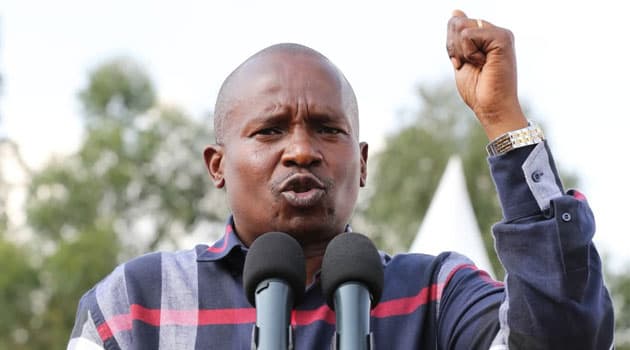We're loading the full news article for you. This includes the article content, images, author information, and related articles.
Deputy President Kithure Kindiki’s declaration that development funding is contingent on political loyalty ignites a firestorm, starkly contradicting the Kenya Kwanza administration's official policy of equitable resource distribution and exposing deep rifts within the Mt. Kenya political landscape.

MATHIRA, KENYA – In a statement that threatens to upend the principles of equitable development in Kenya, Deputy President Kithure Kindiki on Friday, November 21, 2025, warned that Members of Parliament critical of the government will be sidelined in the allocation of national development projects. The remarks, made during a youth empowerment forum in Mathira, Nyeri County, have drawn sharp focus on the Kenya Kwanza administration's resource allocation philosophy and its implications for the constitutional role of elected representatives.
“If an MP’s job is to insult the government, insult the President, insult everyone, he will not get any development,” Kindiki stated unequivocally. He argued that the primary role of an MP is to lobby for projects from the national government in Nairobi. “Therefore, if an MP starts making a showing off and using insults, he will look like a hero. But the people in his constituency will suffer... while roads are being built elsewhere, water is being installed, electricity is being installed... he will not get any development,” Kindiki asserted.
The Deputy President's comments, delivered in the political backyard of his predecessor, Rigathi Gachagua, are set against a backdrop of escalating political tensions and succession battles within the vote-rich Mt. Kenya region. The statement is widely seen as a direct message to a faction of local leaders perceived as being less than loyal to the current administration.
Kindiki's stance appears to be in direct conflict with the official Kenya Kwanza government position on development. On numerous occasions, senior administration officials have committed to a policy of fair and equitable distribution of resources, regardless of political affiliation. In a striking contradiction, Deputy President Kindiki himself, speaking in Machakos on Thursday, November 14, 2025, assured Kenyans that development would be impartial. “As the government we will develop the whole country,” he said. “There is no part that will be left behind because of political, region or religious affiliation because Kenya is one.”
This official policy of equity has been a consistent message from the administration. The government has repeatedly stated its commitment to uplifting all regions, including those that did not vote for the ruling coalition, to ensure balanced national growth. Kindiki's latest remarks challenge this narrative, suggesting a punitive approach to governance where development is a reward for loyalty rather than a right for all citizens.
The Deputy President's assertion that an MP's main function is to lobby the executive for development has also been questioned by constitutional experts and civil society. According to the Constitution of Kenya, the primary roles of a Member of Parliament are representation, legislation, and oversight of the executive branch. This oversight function inherently involves scrutinizing and, at times, criticizing government actions to ensure accountability and transparency.
The principle of separation of powers envisions Parliament as a check on the executive, not as a subordinate body seeking favour. Furthermore, the distribution of national revenue is constitutionally mandated to be equitable. The Public Finance Management Act, 2012, and the Commission on Revenue Allocation (CRA) provide frameworks for sharing revenue between the national and county governments, a process intended to be impartial and formula-based, not subject to political whims.
The warning from the Deputy President is expected to deepen the already significant political fractures in the Mt. Kenya region. The area has become a key battleground for influence ahead of the 2027 general elections, with various leaders positioning themselves for regional supremacy. Kindiki's statement is likely to be interpreted as an attempt to consolidate his authority and enforce political discipline among the region's elected leaders.
Mathira MP Eric Wamumbi, who was present at the event, has previously affirmed his allegiance to President William Ruto and Deputy President Kindiki, while also having public disagreements with other regional figures. The pressure on local MPs to toe the line is immense, with the threat of developmental marginalization now explicitly stated. This dynamic places MPs in a precarious position: either temper their oversight role or risk their constituencies being punished.
The Council of Governors (CoG) has consistently advocated for timely and equitable disbursement of funds to counties, arguing that service delivery should not be held hostage by national-level political disputes. In May 2025, the CoG raised alarms over proposed shortfalls in the equitable share, underscoring the financial pressures on devolved units and the importance of predictable, fair funding. Kindiki's remarks could signal a similar challenge for constituencies at the national level, potentially undermining the foundations of devolution and equitable representation.
As the 2027 election cycle approaches, the weaponization of development resources remains a critical concern for Kenya's democratic health. The Deputy President's statements in Mathira have laid bare the tensions between political loyalty and the constitutional right to development for all Kenyans, a conflict that will undoubtedly shape the country's political discourse in the months to come. FURTHER INVESTIGATION REQUIRED into specific responses from other Nyeri and Mt. Kenya leaders to these remarks.
Keep the conversation in one place—threads here stay linked to the story and in the forums.
Sign in to start a discussion
Start a conversation about this story and keep it linked here.
Other hot threads
E-sports and Gaming Community in Kenya
Active 9 months ago
The Role of Technology in Modern Agriculture (AgriTech)
Active 9 months ago
Popular Recreational Activities Across Counties
Active 9 months ago
Investing in Youth Sports Development Programs
Active 9 months ago
Key figures and persons of interest featured in this article